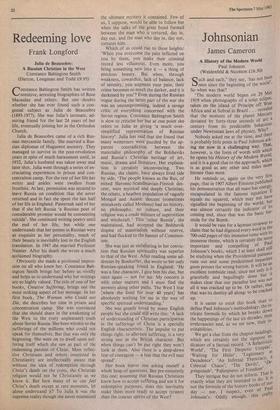Redeeming love
Frank Longford
Julia de Beausobre: A Russian Christian in the West Constance Babington Smith (Darton, Longman and Todd £9.95)
Constance Babington Smith has written sensitive, arresting biographies of Rose Macaulay and others. But one doubts whether she has ever found such a con- genial subject as Julia de Beausobre (1893-1977). She was Julia's intimate, ad- miring friend for the last 24 years of her life, eventually joining her in the Orthodox Church.
Julia de Beausobre came of a rich Rus- sian mercantile family. She married a Rus- sian diplomat of Huguenot ancestry. They managed to survive in the post-revolution years in spite of much harassment until, in 1932, Julia's husband was taken away and later shot. Julia went through a series of ex- cruciating experiences in prison and con- centration camp. For the rest of her life her wrists and ankles were swollen from frostbite. At last, permission was secured to leave Russia on condition that she never returned and in fact she spent the last half of her life in England. Pasternak said of her that if she left Russia 'a Russian poet of considerable promise would be committing suicide'. She continued writing poetry until the end of her life, but while one understands that her poems in Russian were as exquisite as her personality, much of their beauty is inevitably lost in the English translation. In 1947 she married Professor Namier. After his death she wrote a much acclaimed biography.
Obviously she made a profound impres- sion on all who knew her. Constance Bab- ington Smith brings her before us vividly and helps us to understand why her writings are so highly valued. The title of one of her books, Creative Suffering, brings out the most striking aspect of her message. In her first book, The Woman who Could not Die, she describes her time in prison and concentration camp. She was convinced that she should share in the awakening of the West to the (very unpleasant) truth about Soviet Russia. She bore witness to the sufferings of the millions who could not speak for themselves. But that was only the beginning. She went on to dwell upon suf- fering itself which she saw as part of the redeeming passion of Christ. Most reflec- tive Christians and others interested in Christianity are intellectually aware that without the idea of redemption through Christ's death on the cross, the Christian religion would not be Christianity as we know it. But how many of us can feel Christ's death except at rare moments, let alone understand it? To Julia it was the supreme reality though she never minimised
the ultimate mystery it contained. Few of us, I suppose, would be able to follow her when she talks of the great bond formed between the man who is tortured, day in, day out, and the man who day in, day out, tortures him.
Which of us could rise to these heights: `When you overcome the pain inflicted on you by them, you make their criminal record less villainous. Even more, you bring something new into it — a thing of precious beauty. But when, through weakness, cowardice, lack of balance, lack of serenity, you augment your pain, their crime becomes so much the darker, and it is darkened by you'? Even during the Russian vogue during the latter part of the war she was an uncompromising, indeed a savage critic of everything concerned with the Soviet regime. Constance Babington Smith is slow to criticise her but at one point she refers to Julia as giving 'a much over- simplified representation of Russian history'. Julia has said that she found that many westerners were puzzled by the ap- parent contradiction between the materialist philosophy of the Bolsheviks and Russia's Christian heritage of art, music, drama and literature. Her explana- tion is certainly unconvincing. Two Russias, she claims, have always lived side by side. 'The people known as the Rus, of mixed Slavonic-Scandinavian-Finnish des- cent, were mystical and deeply Christian; the others, a heathen population of vaguely Mongol and Asiatic descent (sometimes mistakenly called Moslems) had no history, no philosophy, no culture, and their religion was a crude mixture of superstition and witchcraft.' This 'other Russia', she maintained, had accepted the Bolshevik dogma of materialism without reserve, and had flocked to the banner of Commun- ism.
She was just as unfaltering in her convic- tion that Russian spirituality was superior to that of the West. After reading some ad- dresses by Bonhoffer, she wrote to her only Russian-speaking friend in England: 'He was a fine character, I give him his due, but once again — not for me. My concern is with other matters and I must find the answers along other paths. The West I fear [where she lived for over 40 years] has absolutely nothing for me in the way of specific spiritual understanding.'
She was greatly loved by many English people but she could still write this: 'A lack of understanding of Christian participation in the sufferings of Christ is a specially English characteristic. The impulse to put things right, to alleviate suffering, is a very strong one in the British character. But when things can't be put right they won't look at them. Also there is a deep-down fear of contagion — a fear that the evil may spread'.
Her book leaves one asking oneself a whole heap of questions. But pre-eminently this one; assuming that Russian Christians know how to accept suffering and use it for redemptive purposes, does this inevitably make them more ready to accept tyranny than the coarser spirits of the West?










































 Previous page
Previous page